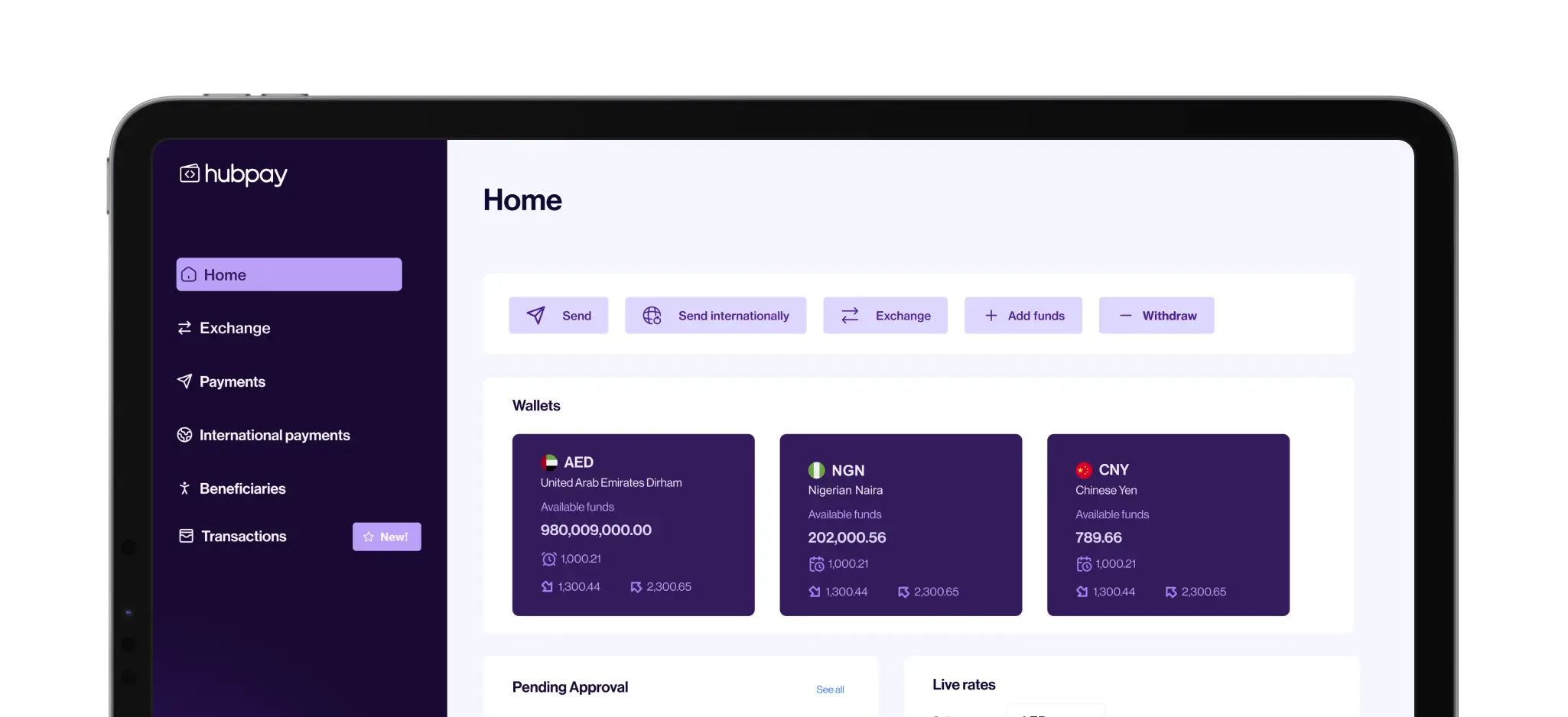Learn how to become a freelancer in Dubai with this step-by-step guide, including licensing, visas, and receiving payments seamlessly through Hubpay.
Published on 19 May 2023
Updated on
02/10/2024
7 minute read
In recent years, Dubai has become a magnet for freelancers from all around the world.
Its growing economy, modern infrastructure, and tax-free status make it an ideal place for professionals who want to work independently.
If you're curious about how to become a freelancer in Dubai, you’re in the right place. We’ll break down everything you need to know, from the legal requirements to tips for thriving in this dynamic city.
Why freelance in Dubai?
Before we dive into the details, let’s quickly talk about why Dubai is such a hot spot for freelancers. Some key perks include:
Tax-Free income: One of the biggest draws to Dubai is its zero personal income tax policy. Yes, you heard that right—no taxes on your freelance income!
Networking opportunities: Dubai is a hub for global business, which means there's an endless flow of networking events, meet-ups, and conferences. This is a great place to connect with potential clients and collaborators.
Lifestyle and work-life balance: Dubai offers a fantastic lifestyle, with beaches, luxury amenities, and a multicultural environment. As a freelancer, you can enjoy flexible hours while living in one of the world's most vibrant cities.
Now that you’re convinced, let’s walk through the step-by-step process of how to set up your freelancing career in Dubai.

Step 1: Choose your field
The first thing you’ll need to decide is your niche or field of work. Dubai has a diverse economy, but some areas are more freelancer-friendly than others. These include:
Creative fields: Graphic design, photography, writing, and social media marketing are in high demand.
Technology: Web development, IT consultancy, and software engineering have strong markets.
Business services: Freelancers in business consultancy, accounting, and project management are thriving.
Whatever your expertise is, the key is to pick a field where there’s demand and where you can leverage your skills to stand out.
Step 2: Understand the freelance licensing requirements
Unlike some countries where you can just declare yourself a freelancer, Dubai has formal processes you’ll need to follow. Freelancers are legally required to have a work permit, often referred to as a freelance visa.
Here’s a breakdown:
Freelance license options
Dubai offers several free zones that cater specifically to freelancers. Free zones are economic areas that offer benefits like 100% ownership and no corporate tax. Each free zone has its own set of rules, but they are generally favorable for freelancers. The main options are:
Dubai Media City (DMC): Perfect for media professionals, such as writers, content creators, photographers, and graphic designers.
Dubai Internet City (DIC): Ideal for tech professionals, including software developers, IT consultants, and digital marketers.
Dubai Design District (D3): Geared toward creatives like fashion designers, architects, and visual artists.
Freelance permit process
Once you’ve chosen a free zone, you’ll need to apply for a freelance permit. This is essentially your license to work as a freelancer in Dubai. The application process usually involves:
Select your activity: Each free zone offers a list of activities you can choose from, based on your profession.
Submit documents: You’ll need to submit documents such as a copy of your passport, your résumé, proof of experience, and passport-sized photos.
Approval and payment: After submitting the required paperwork, you’ll receive approval (usually within a few days). Then, you’ll pay the licensing fees, which can range from AED 7,500 to AED 20,000 annually, depending on the free zone.
Once your permit is issued, you're officially a freelancer in Dubai!
Step 3: Obtain a Freelance Visa
To legally live and work in Dubai as a freelancer, you’ll need a freelance visa. If you’re already living in Dubai on a residency visa sponsored by a family member or spouse, you can skip this step. However, if you need a visa, most free zones offer visa packages when you apply for your freelance permit.
Visa process
Here’s a simplified version of the freelance visa application:
Apply for an entry permit: This allows you to enter the UAE to complete the visa process. Once you’re in, you can start the medical tests and visa stamping procedures.
Medical tests: You’ll be required to undergo basic health checks, including blood tests and chest X-rays.
Visa stamping: After your medical results come back, you’ll submit your documents to get your visa stamped in your passport. This visa usually lasts for two or three years, depending on the free zone.
Emirates ID: Once you have your visa, you can apply for an Emirates ID, which serves as your identification card while living in the UAE.
Step 4: Set up a bank account
After securing your freelance license and visa, the next logical step is to open a bank account in Dubai. This will make managing your finances and receiving payments much easier. As a freelancer, you have two options:
Personal bank account: This is the most straightforward option, especially if you’re working on a small scale and don’t need business banking services.
Business bank account: If your freelancing activities are more substantial, or you plan to scale, you may prefer to open a business bank account. This requires additional documentation but gives you more options for managing your finances.
Receive payments seamlessly with Hubpay
Receiving payments as a freelancer in Dubai is a crucial aspect of managing your business. While bank transfers are the traditional way to handle transactions, digital payment platforms like Hubpay offer freelancers a convenient and cost-effective solution.
Hubpay is a leading fintech platform in the UAE designed for seamless cross-border transactions. Here's how freelancers in Dubai can benefit from using Hubpay:
Fast, secure payments: Whether your clients are local or international, Hubpay allows you to receive payments quickly and securely. Your clients can send money from their bank accounts and you’ll receive funds directly in your account.
Lower transaction fees: Hubpay is known for its lower fees compared to traditional bank transfers, particularly when dealing with international clients. This means you keep more of your hard-earned money, especially if you're working with clients outside the UAE.
Multi-currency support: Freelancers often work with clients from different countries, which means dealing with multiple currencies. Hubpay supports a variety of currencies, making it easier for you to get paid without worrying about hefty conversion fees.
Easy-to-use platform: The Hubpay app is user-friendly, allowing freelancers to track payments, manage transfers, and receive notifications when payments arrive—all from your smartphone. It’s a hassle-free way to ensure your cash flow stays consistent.
No hidden charges: Hubpay provides full transparency when it comes to fees, so you’ll know exactly what you’re being charged for each transaction.
By using Hubpay, freelancers can avoid the often slow and expensive processes associated with traditional banking. Whether you’re working with local businesses or clients halfway across the globe, Hubpay ensures you get paid on time and with minimal fuss.
Step 5: Market yourself
Once you’re set up legally, the real work begins! Getting clients as a freelancer in Dubai requires some solid marketing efforts.
Build an online presence
Your website and LinkedIn profile are your digital storefront. Make sure these are professional, polished, and optimized with relevant keywords to attract clients.
Create a portfolio: Showcase your best work.
Network: Attend events and connect with people in your industry.
Use Social Media: Leverage platforms like Instagram or Facebook, depending on your niche.
Freelance platforms
There are also several platforms that can help you find clients, such as Upwork, Freelancer, or Fiverr. These platforms allow you to pitch for projects and build your reputation through reviews and testimonials.
Step 6: Pricing and invoicing
Deciding how to price your services can be tricky, but a good rule of thumb is to research what others in your field are charging. You want to remain competitive while also making sure your rates cover your expenses and leave room for growth.
Ensure your invoicing system is professional and efficient. Consider using software like FreshBooks or QuickBooks to manage invoices, track expenses, and receive payments.
Step 7: Stay compliant
As a freelancer in Dubai, you’re responsible for keeping your documents up to date, such as renewing your freelance permit and visa when necessary. Missing these deadlines can lead to fines or even losing your ability to work legally in the country.
Conclusion
Freelancing in Dubai offers a world of opportunity, from tax-free income to a dynamic and ever-growing business environment. With the right preparation, it’s easier than you think to get started.
Stay organized, market yourself, and build a network that will help your freelance career thrive. Dubai’s vibrant market is ready for freelancers, and with these steps, you’ll be well on your way to becoming one.
Frequently asked questions
Share this blog on
Get your free multi currency account
Multi-currency global account made for UAE Businesses. Get a free consultation for your business.





